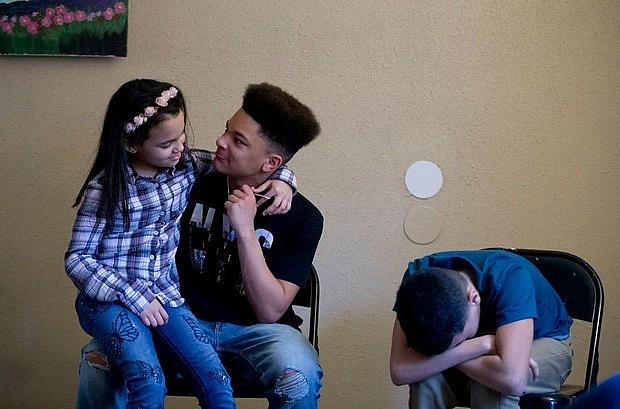Reading, Writing, Evicted: A no-cause eviction haunts a mom and her three kids
This series was produced with the support of the University of Southern California Annenberg Center for Health Journalism and its Dennis A. Hunt Fund for Health Journalism.
Other stories in the series include:
Reading, Writing, Evicted: Driven to stay in school
Reading, Writing, Evicted: How Austin, Texas, hopes to combat student turnover
Reading, Writing, Evicted: Portland's housing crisis is an education story
Reading, Writing, Evicted: Portland children don't pay rent but they are paying a price
Reading, Writing, Evicted: Whole classrooms suffer when high rents upend children

Jaden, left, Jenaya and James inside their Portland apartment.
The man from the collection agency who’d been hired to go after the Portland mom wasn’t in the courtroom.
Could she catch a break for once?
Tucked in the back of the courthouse, with its blue plastic chairs, rotating judges and lawyerless defendants, small claims court lacks the formality of million-dollar civil affairs or criminal proceedings.
But for Nina Taylor and her three children, the stakes weren’t small.
The thousands in alleged damages her landlord wanted her to pay was enough to financially wreck her family at a time when she felt Jenaya, 9, James, 12, and Jaden, 14, had already lost so much.
Being evicted mid-school-year for no cause had taken a heavy toll on her three children.
Each child lost friends. Got severed from educators who knew best how to reach them. Had to spend hours studying to catch up to peers in their new school district.
In their old neighborhood in North Portland, where students flow together from James John Elementary to George Middle School to Roosevelt High, teachers had promised Taylor “a very warm hand-off” for her two sons’ upcoming moves to middle school and high school.
Instead, the eviction brought Jaden a childhood nightmare: Less sports, more math.
Jaden in his math class at Ron Russell Middle School.
The switch to a school district with higher academic standards meant Jaden needed a support math class in addition to the regular one, so one fourth of his school day is dedicated to his least-favorite subject. The track team, meanwhile, was off limits: Children who move mid-school-year miss out due to rules designed to prevent gaming the system.
Already upended, Jaden will switch this fall to the district’s only high school. It’s the biggest high school in Oregon by far, and most students there have gone to middle and even elementary school with fellow students at the school. Jaden’s made friends, but knows his first day of high school will be filled, mostly, with strangers.
What he looks forward to is how, if all goes according to plan, he’ll one day play a football game against Roosevelt High. He imagines how on that day he’ll see his old friends and ask how they are.
“It’s frustrating because you want to see your kid succeed and you want them to have a stable foundation to succeed in and when you are uprooted it throws everything off balance,” Taylor told The Oregonian/OregonLive. “It’s such a critical time in a kid’s life.”
The appointed time for her trial arrived and passed. With every minute the courtroom clock counted, her hope expanded.
It’s been more than a year since the eviction and she sees how her children are still paying a price.
She wonders if James, a fifth-grader, will adjust. He’s extremely smart, but has a disability that requires him to spend time in a special education room to control his anxiety, his mom said. It unnerves him when other children go off task. He likes to know what to expect and will often case a room like he’s on patrol.
David Poulshock walks around the track with his grandson, James, before James catches the morning school bus. Due to his daughter Nina's work schedule, David sometimes pitches in supervising his three grandchildren as they prepare for school.
Sometimes his temper can be hard to contain and he gets in fights. It’s behavior that crops up at school when tension is high. She doesn’t see those mood swings much at home. For that reason, she counts on his educators to teach him not just academics but how to be a person in the world. She counts on them to know her son. For children who have extreme emotions and require calm, those life skills can save them from accidentally being perceived as a threat by police.
She pulled her cardigan tighter around her chest, obscuring the tattoo below her collarbone that spells out in Latin the Oregon motto: “She flies with her own wings."
Taylor is a Portland native. She’d gone to college — a debt she was still paying off — so she could help people. Her job as a medical assistant paid $23 an hour and gave her family full health care benefits. She was studying to become a registered nurse. Why was it so hard just to pay the rent?
The money her former landlord demanded for supposed damage to her old apartment was one more millstone and felt unfair. On lunch breaks Taylor called carpet companies and carefully typed up cost estimates. She researched what other tenants said online about the property owners. Review after review claimed the owners wrongfully took people to court for false damages.
She printed out the quotes and reviews and slid them into a folder she now clutched to her chest, a slingshot she hoped would be enough to take out her Goliath.
The judge called her name.
The man from the collection agency wasn’t there.
He was busy, the judge told her. He handled a lot of cases, but he was coming for her, he would be there, he was on his way.
And show up he did. He asked her to step out into the hall to see if they could strike a deal to avoid trial. He dismissed her cost estimates and said he saw these kinds of cases all the time; the costs were in his opinion not uncommon.
“This is my life,” she sighed.
“It’s just the way the business works,” he told her.
In the end, she got him to knock off almost $2,000, a victory, but still a loss. Over the next two years of the payment plan, there will be $100 less every month to spend on groceries, sports and the other things Jaden, James and Jenaya will need.
[This story was originally published by The Oregonian.]
[Photos by Beth Nakamura / The Oregonian.]

